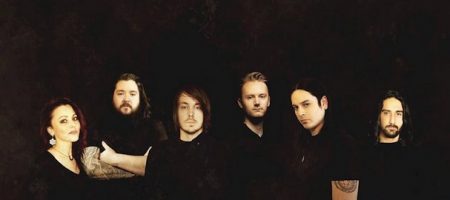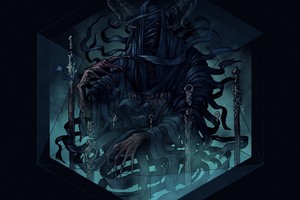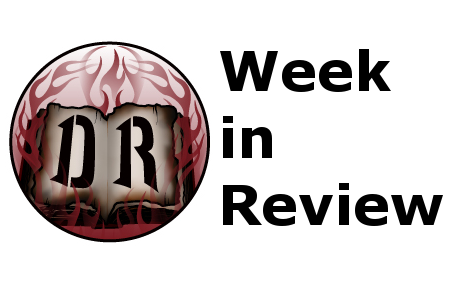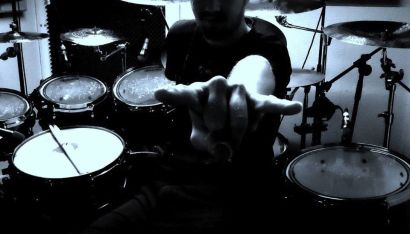Hannes Grossmann – Away from the Light
Sunday, 20th June 2021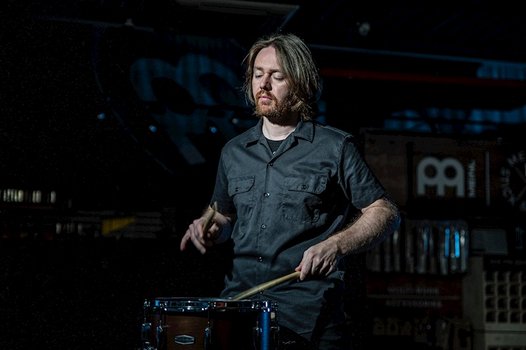
A name at this point rather known to many within the extreme metal scene, Hannes Grossmann has been a part of many influential acts, from Necrophagist and Obscura to Alkaloid and more – not even including the number of releases he has done session work with and/or toured with. There’s a reason why he’s one of the first names mentioned when it comes to extreme drumming, and his solo efforts have just as much potency and thrilling moments as any of his other works. He has recently released Where the Light Retreats, and we were able to have a chat with him over Skype the day prior to release. We dug into many topics, from the album to his love of mountains, to the range of experiences he had had with different bands and being a producer himself.
Dead Rhetoric: What do you like about releasing your own, solo material as opposed to a band release?
Hannes Grossmann: There’s advantages and disadvantages at the same time – I don’t get a second opinion. Sometimes that’s great, and when you are in a band you don’t want to impose something on someone if they don’t like a particular song or idea. So there’s no second guessing. But at the same time, it can be a real disadvantage. When you play with great musicians, that second opinion can be very valuable. You might find that times where you thought you were right that you weren’t. So you think about it, and there might be a point to what that other guy said and you change things.
With my solo material, I don’t have that at all. It’s really a shot in the dark. Of course, I like the songs, but I absolutely cannot tell if it’s objectively good [laughs]. There’s no second guessing by anyone else. It’s just the songs, in the way that I have written it, and that’s it! If there is a positive response then I’m really relieved, because I can never tell. With this record, I still can’t tell. I like the songs on it, but I don’t know…do I like it because I have written the songs on it or because the songs are actually good? I have no idea [laughs]. That to me is the main difference.
Also, with Alkaloid I give the songs much more thought. We set up the band to be as progressive and unique as possible. Sometimes I don’t use ideas if I get the feeling that I have used the exact same thing in the past. I would rather wait for a fresh idea to come along. With my solo stuff, I really don’t care. I can give you an example. The first song, “The Great Designer” – the first riff and how it sounds and its structure sounds like “Blackened” by Metallica. It was an accident, but with Alkaloid I probably would have changed it around so that it doesn’t sound too much like other bands. But I don’t give a shit with my solo stuff. “Oh, it sounds like Metallica? Great [laughs]! Let’s do it.” So I don’t second guess things too much.
I write a song and then it gets recorded. It sounds complex and complicated, like I put hours and hours into the songs, but actually, I put songs together really quickly. On the last album, there was a song called “Vacant Dreams,” that I wrote on an airplane on my laptop. I got an idea in my head so I wrote down the notes and the song was done. That’s the final version of the song. There’s less thought in my solo music than you would think. It’s more about spontaneous writing.
Dead Rhetoric: I know with a lot of your solo stuff, you bring in a lot of people that you have worked with before, such as Alkaloid members. Is it a different dynamic then, knowing that it’s just you on the solo front and you are just bringing in people to fill a role – even though in other scenarios you would be looking more critically at the material?
Grossmann: Maybe I would look more critically at it, that’s true. But on this album, the line-up is pretty much Alkaloid and V. Santura on vocals. It always depends on what the actual part is. Let’s say my buddy Christian Muenzner plays solos on the record. I know that I will like what he will do. I have worked with him for so long and I know his style. I know his musical tastes and texture. If I give a song to him and ask him to play a solo, I know I’m going to like it. I won’t have to be too critical about it, it will come out really good. So it’s never a problem.
My only advice for a guest solo is to just play whatever you want. Maybe I have a hint sometimes, like maybe play a melodic solo or something but that’s about it. Sometimes I don’t give any hints. I just want them to play whatever they want. For vocals, it’s different. I have written the lyrics and the vocal lines, rhythmically, with the music. I am depending on the singer. I make a demo, which sounds completely horrendous [laughs] because I’m not a singer, but they get the rhythm right and know what to do. They know how the vocal line is arranged. I also will accept changes for the vocal lines. On this album, most of the songs have V. Santura on vocals, and he had some suggestions for the rhythmical structure in some parts. There were certain words and phrases, and most of the time we did it his way if it felt more natural. So it’s not really that different from a band. If people have suggestions, I’ll gladly take them in and consider them. Sometimes there are some suggestions where I want to stick to my original idea, but most of the time there aren’t a lot of suggestions because people listen to it and it makes sense to them.
I’ve been doing music for such a long time that I know how to structure a song and arrange it. There’s not a lot of conflict there. It’s very clear what I want. With my guys in Alkaloid, it’s really easy because we have worked on a lot of stuff together with those guys. Especially when, with them, when they don’t have to give that critical judgement, they can just be musicians. Sometimes I do that as a drummer for other people in session work and it can be very relieving not to have to make the decisions. You play your part and when the album comes out it’s very nice. You just go into the studio, you record it, and get the final result. That’s a great thing.
But for the solo record for me it is completely different. I write the songs, arrange them, write the lyrics, and then I mix the songs as well. So I have to go through all of the production stages. I have listened to the songs so often that I have lost the critical judgement, weeks or months ago. Again, I have no thoughts whether it’s objectively good anymore. But even after this whole production cycle, I still enjoy the songs to a certain degree. So for me, it’s a success because I have put out a record that I would like to listen to. That’s really the only parameter I think about.
Dead Rhetoric: What are you proud of with your latest album, Where the Light Retreats?
Grossmann: Right now, I have the cd in my hands as we speak. I have sent out the packages for the release tomorrow – I’m proud of the whole thing. When you think about it, it’s actually a pretty big effort to self-release an album. You have to coordinate every little step. It’s really a work of art. I would say that I’m proud of the whole thing and how it pulled through from the beginning to the end. As far as being different from the other albums, I would say that the songs are maybe a bit more accessible, from the point of view of someone listening to my music for the first time. This is probably the most accessible record, and I’m proud of that. I tend to overcomplicate songs sometimes. That’s not the case on this album. It gets to the point much quicker. I have been working on that as a songwriter. To get the message across as quickly as possible. So I’m satisfied with that with this release.
Dead Rhetoric: Could you discuss the cover art for Where the Light Retreats?
Grossmann: The artist I used for this Caelan Stokkermans. I had no idea what kind of artwork or with whom I wanted to do it with. Then I put a post on Facebook asking for help and he was mentioned quite a few times by people in the comments. He had some artwork that looked really impressive. What I liked was clear lines. When you look at my other records, two of them are hand-drawn and minimalistic. The last one, Apophenia, has photography. I’m really not a fan of the super animated stuff. It’s just a matter of taste – I’m not really fan of all the Marvel movies and stuff. I don’t know, CGI isn’t really for me. I don’t like the way it looks. This is a drawing by Caelan, with some animation.
I had an idea in my head – it had to be something with mountains. I’m obsessed with mountains. Actually, I’m completely obsessed with mountains [laughs]. Mountaineering and all that stuff. The album isn’t all about that, but I was thinking about how I could put it together and mountains are always a nice way. Also, there is one song that is vaguely about mountaineering but is also about something else [“Dhaulagiri”], which is also a mountain in Nepal. So I thought, good enough – we can put a mountain on the artwork [laughs]. You see how deep this concept goes [laughs]! It’s not so thought out. But I wanted to put something I like on the cover. The imagery has to capture a certain mood. When I look at the artwork, its kind of like mountains with a little HR Giger. That’s two things that I really enjoy artistically.
I had an image in my head that I tried to communicate with Caelan, and he did it perfectly. But it doesn’t necessarily represent the music or the lyrics because it’s not a concept album. The lyrics are about a great many different things. So there was no way that it couldn’t be represented by a single piece of art, so I decided to go with a mood that I could identify with. I think the mood is captured on the cover. When you listen to the album, it really fits with the cover. That’s what I wanted. It might not be a deep concept, but it’s more about a mood or feeling.
Dead Rhetoric: So what is it about mountains that really draws you to them?
Grossmann: I’m not sure – you might need a psychologist to analyze that I guess [laughs]. I’m fascinated by the way that mountains look. There’s a certain feeling as well. Especially when you are deep in the mountains. I’ve been to the Himalayas twice and when you are among them, it’s almost like a spiritual situation. You can really feel how insignificant you are, when you stand among these ice giants. I am really not a spiritual or religious person, but I think being the high mountains and looking at how majestic they are – I find mountains extremely beautiful. When I look at it, it’s as close to a spiritual/religious feeling that someone like myself, a complete atheist, can get. So maybe it’s that. A proxy for a non-existent religious feeling. Or maybe it’s just like a nice painting. Some people have certain feelings when they look at pieces of art, and I get that when I look at mountains. It’s something that can be very addictive. On Instagram, there’s only mountain pictures, nothing else. Not even music, I only follow like 2 musicians and that’s it. I’m only looking at mountains. It’s something I’m quite fond of and not sure why.
There’s one fascination I have with mountaineering, even though I do not climb mountains myself. But it really comes as close to the answer of ‘is there a purpose in life?’ When you think about it, climbing mountains is completely useless. There’s no use to society or use for you other than the enjoyment of it, or you might suffer and die. But for someone who climbs, it’s the most meaningful thing there is. It’s a contradiction I find really interesting. There’s no purpose in life, unless you are putting it into what you are doing. I think there’s some spirituality and philosophy within that world of mountaineering that I find so completely fascinating.
Dead Rhetoric: You have worked with a slew of different bands over the years, both in studio and as a session drummer live. What do you pick up from each experience with different bands?
Grossmann: It’s probably the biggest influence on my playing. The music you play shapes your identity as a player. So all of that session stuff influences my own playing. It forms my own musical textures. Every band I have played in, and every recording, is important in that sense. It gives me a different musical situation that I have to adapt to and be creative with. That influences me on a much higher level than just listening to records. When you have to play something from start to finish. I would say that each recording and live show made me the player I am today and made me become a better musician over time. That’s always what I tell younger drummers or musicians when they ask for advice.
I always tell them is that when you are able to play songs, they should play them with other people. Those people will influence you. It will be a learning curve that you don’t get from sitting at home and making Instagram videos. This is something that I find really important. It’s also something I find a bit strange, with mentioning Instagram again, and YouTube. Musicians only doing videos for other people. They aren’t really doing music, because music happens with the interaction of other players. Not only, but it’s a big part of it. I am very skeptical of this trend of playing 1 minute videos of a drum solo. It can be entertaining, but it should not be the only thing you are doing. It’s something on the side, but not your main focus.
Your main focus as a musician should be playing real music, real songs you are writing with other people, and create something new. That’s always what I wanted, and successfully did with my career. Looking back at the different bands I have played in, most of them are metal. But that’s because I started with metal. I could play different kinds of music, but of course other metal bands ask me to play with them because I’m associated with that type of music so I stick with it. I really enjoy it. But the variety was important for me, and it really helped me to become a better musician in the end.
Dead Rhetoric: Likewise, do you feel your work on the other side of the board at Mordor Sounds as an engineer has given you an additional toolset for writing music? What else do you like about it?
Grossmann: It’s something I’m really interested in. The whole sound aspect. I started doing my own studio in like 2014-15 as I did a lot of recordings and I realized that the recording process – with any band I was in, I enjoyed that the most. So I decided that I should focus on it. But recording, producing, and mixing is difficult. I had to shape up my knowledge and get up to speed with everything. I’m really glad I did it, and I’m still learning new things every day. It’s a different aspect. It’s also a different task to be an engineer instead of a musician. Sometimes when you record people and you are the engineer, you focus on entirely different things. It gives you an outside perspective. But it also gives you the ability to be more objective about what you are writing for your own music and what you record. Being an engineer, I learned this outside perspective. You cannot be emotionally invested as an engineer in the same way that the guy is that is recording. You have to be objective and say, “Take 1 was better than take 2. Let’s use take 1.” Or things like that. It’s very helpful.
It’s fun, but it’s more complicated than that. It’s very enjoyable work, to sit with another musician who has written songs, and let’s say you dial in the guitar sound – people are really happy with the guitar sound and you can feel them getting excited to finally hear the songs that they played in the recording room with a so/so sound. You make it sound good, and it’s very fulfilling. I’m reading audio magazines and checking things out on YouTube – I’m totally invested in the whole mixing thing. This is completely different than working as a drummer or composer. It gives me a new perspective to my daily work. It gets much more diverse. So there isn’t as much repetition, so I can do a week of just session work or writing, and not just mixing an album for two weeks straight. My whole work as a musician becomes more diverse. I am very easily bored so that’s been a bonus.
Dead Rhetoric: You mentioned making things overly complicated sometimes. What factors do you see as being most important when you are writing technical/progressive metal and trying to avoid that?
Grossmann: When I write a song, most of the time I am just writing it down into a program. The sound is not final because it’s not electric guitars – but I can judge the notes and see if they are right or if they fit together. It’s a very analytical tool. Also, when I have a feeling that it might be complicated, I try to take out whatever is unnecessary to get from one part to another. When I have two completely different parts, you need to build a transition, so I have come up with a way to build that into the ending of one part and have it lead into the next one so that I don’t have an obvious transition. It’s written right into the part. This way it becomes more streamlined and more accessible, and less complicated. It’s more to the point, and that’s what I’m working on.
Getting straight to the point with any idea or riff in a song. Then the task is not to cut something away that is interesting. You should not circumcise your songs [laughs]. That’s not beneficial. A lot of the time, when you play technical metal, there are parts in a song that are not necessary for the song. They are cool parts, but use them for something else. Maybe they don’t have to be in that song. That’s a critical way of thinking – does that part have to be in the song? If the answer is yes, then I keep it. If no, then by all means delete it or use it for something else. Just because you like a certain part, it doesn’t mean it has to be in a song. It might be a great part but it doesn’t necessarily make the song better. That’s my ultimate goal. To make the best song out of the riffs that are in the song. So start with certain ideas, try to bring them together, build the song in an organic way, and then try to cut out the parts you don’t necessarily need.
Dead Rhetoric: That takes a lot of self-reflection on your part to be able to be critical and remove things that don’t belong.
Grossmann: I think it’s a big challenge, but it depends on the music. Some music is already shaped to be that way. Pop songs for instance. Most of the time, the pop song structure is very clear – verse/chorus or something like that. You have a restriction there. You have to move within a restricted area. You don’t have to cut anything out because the structure is there from the beginning. With technical metal you can do anything. You can write a drum solo and put guitar riffs on top of it. But you have to limit yourself to certain things.
For me, the challenge begins when you don’t have a pop song structure. That’s very restrictive. I want to break out of that set structure. But again, if you can do anything it can become a total mess. It takes a lot of discipline to try to analyze a song from a mostly objective point of view. It’s hard with your own music because you are not fully objective. It’s tricky. Some good advice is to not overthink it, just do whatever your gut is telling you to do. That should be right most of the time.
Dead Rhetoric: You’ve done a book and instructional DVDs for drumming. How important is education and giving back?
Grossmann: It might surprise you, but it’s not really that important I have to say [laughs]. I did the dvd because I was getting a lot of questions on how I played blastbeats, moving my hands, and what my drumming is about. I started to play some drum clinics and there were a lot of questions and interest in what I was doing, so I decided to put it all together on a dvd. So I did that – of course I had a lot of technical restrictions because I had to film and record it myself and the only thing I could do was play the drums back then. The audio is so/so and the video editing is so/so but I couldn’t do it better. But for what it is, I’m really proud of it and it was great doing it. People seemed to really like it and it seemed to have helped some people, which is great.
The book came about because I was asked by the publisher to do a book on extreme metal for people who didn’t know about extreme metal. It seemed interesting so I wanted to do it. It’s always because people ask me to. I play some clinics too. But again, I don’t feel the need to go out and teach my techniques. When I was asked by Drum-Technique Academy to do an online clinic for them, I looked at their materials and thought they were way better. They were very structured. If I was a young drummer and I wanted to approach double bass drumming, I would definitely book that program. So with songwriting, it’s different. Most of my songwriting comes from a position where I stand in front of my cd shelf and I try to find something to listen to. If I don’t have the feeling to listen to something because I have listened to them hundreds of times, instead I want something new. But what? It doesn’t exist, so I have to write it.
My music comes from a position of lacking something. What I want to describe with my music is something that hasn’t been done by anyone else. If someone can do it, the songs that I imagined, then I could just stop writing songs because someone could do it better than me [laughs]. So with education, I think there are other teachers out there better than me. I don’t feel the urge to teach, but I’m happy to help out when asked. But it’s not an intrinsic thing I need to do. Producing and writing music, that’s something I need to do. But with education, I don’t feel that same urge to do it. I don’t view myself as a teacher. I’m a musician who can maybe give some advice, and it’s not always very thought out. Sometimes I don’t know what I’m doing. What advice should I give to someone if I didn’t really analyze my own movement? I’m really not as interested in the education/clinic aspect, but whenever I get involved with it, it’s really positive.
Dead Rhetoric: After the release of the album, what’s ahead for 2021 with any of your bands/projects?
Grossmann: I am doing two mixes, one will be the new Eternity’s End, which is power metal by my buddy Christian Muenzner. It’s really good stuff. We are going to mix that and I’m looking forward to it. The songs are really good. We already recorded guitars and they came out great. I’m totally stoked for that. I am doing session drums and a few mixes and recordings. Then we are pretty close to finishing the songwriting for the next Alkaloid record. That’s going to happen sometime this year. It will be stressful because the music is very demanding. I’m not sure if I’m looking forward to that [laughs] but it will definitely happen this year and will release next year. The last Alkaloid album took a long time to make and was extremely difficult. There are so many different layers and textures. I don’t expect anything different from the next one.
I have also already written a few songs the next solo album. We’ll see how long that takes. From the ideas I have so far, it will be straighter and more melodic, but then again, I have some very complicated songs [laughs]. I don’t even know that I want to do them anymore because I’ve done it for so long – the super wacky technical stuff. Sometimes it’s time for something new. At some point, I would like to do a jazz fusion album. With the pandemic I have had more time and I invented the time to tap into jazz drumming again. When I was younger I learned some jazz stuff, but with touring and playing in bands I didn’t really focus on it. But in the last year, I have got back into swing patterns and all that. It something I would really like to do – a real jazz fusion album. Maybe it will happen somewhere along the line, probably not this year.











